You and I have made it to episode number 200 together. This, my friend, is a milestone. It was pretty awesome when we got to episode 100. But now, we are at 200. This is almost four years in the making, my friend. I couldn’t be happier that you have joined me on this journey. I want you to be with me for the next 200 episodes as well.
This episode, in particular, I’m quite proud of because it is a culmination of some of my favorite knowledge bombs. I have my favorite interviewer in the world interviewing me, this is my wife, Orion Talmay. She has her own wonderful podcast, Stellar Life. She interviews some of the most amazing people in the world—big-time authors, speakers, personal development experts, and so forth.
You know what? Couples who podcast together stay together. You’re going to love this episode. It’s got a lot of good stuff and we go off on some really interesting tangents that may not be directly related to marketing but will enhance your life, I promise. Now, without any further ado, on with the show.
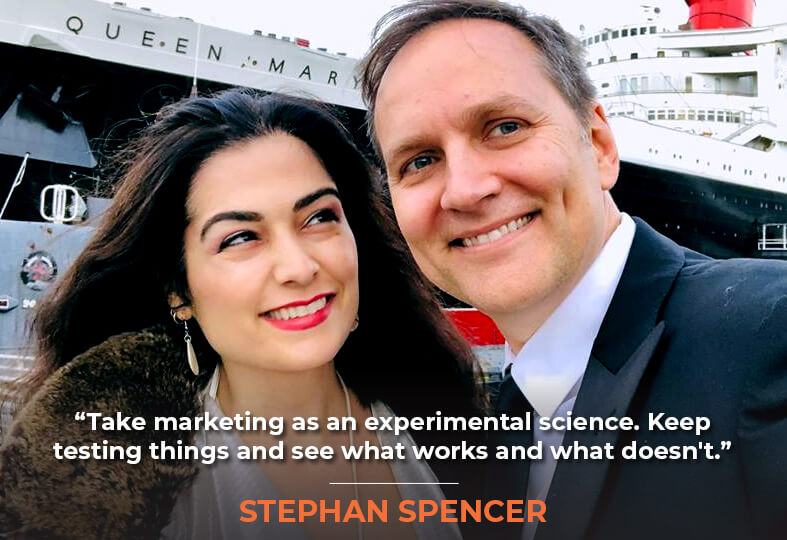
Transcript
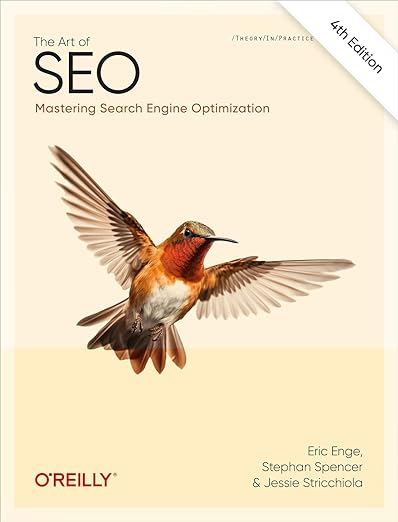
Stephan Spencer is an internationally recognized SEO expert consultant and best-selling author. He’s the co-author of The Art of SEO, author of Google Power Search, and co-author of Social ECommerce. Stephan founded Netconcepts in 1995 and grew it into a multinational SEO agency before selling it in 2010 to Covario. Stephan invented a pay-for-performance SEO platform called GravityStream that was also acquired and is now a part of Rio SEO. Stephan’s client-post acquisition have included Zappos, Sony, Quiksilver, Best Buy Canada, Bed Bath & Beyond, and Chanel. Stephan is a contributor to Harvard Business Review and Adweek among others and the host of two popular podcast shows Get Yourself Optimized and Marketing Speak.
My name is Orion. I am Stephan’s wife. I am proud to have a beautiful interview for our 200th episode with my very talented man, Stephan Spencer.
Thank you, baby. It’s great to be here.
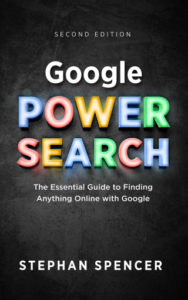
How are you feeling about this 200th episode?
It’s quite a milestone. I’m very excited to have gotten to this point and I’m excited to keep going. I haven’t lost the momentum and the drive to continue. So stay tuned for plenty more awesome episodes.
Why do you do this podcast?
I do it in part because I want to learn myself. I want to upscale and I want to share knowledge and expertise with a lot of my tribe. That spans not just SEO but also other areas of online marketing like Facebook Ads, paid search, analytics, usability, email marketing, you name it.
What feedback do you get from people about the show?
I don’t get enough feedback, unfortunately, it’s kind of quiet. By the way, if you’re listening and you love the show, please tell me. Send me an email or something.
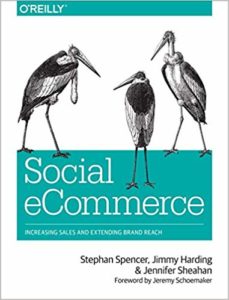
And write a review and let him know because he’s working hard on this show and he’s bringing cutting-edge information to your ears. This can help shift your life and your business. A way for you to give back is as soon as you finish this episode if you’re not driving, go and write a review and you can email Stephan and let him know how you feel about the show.
Yeah, my email is [email protected]. Tell me what you think and what you’ve gained out of the show. I have even more fuel to keep going.
But I know that when people meet you in person, they talk to you about the show. What do they say? What stuff they will say to you?
Clients that I have regular calls with will comment on what they’ve learned from the show and tell me, “I want to implement this thing or that other thing.” Push notifications is an example from one of my clients. He’s got six million unique visitors a month that is a very popular website. He’s like, “I just learned about push notification services and I want to give this a go. Can I speak to the guest that you interviewed because he seems to be pretty clued into this.” I arranged for that. It was pretty cool.
When clients work with you, they don’t only get your skills, expertise, and your many decades of doing what you’re doing, they also get the connections that you have through the podcast. Also, you travel so much and you meet lots of people in high places so they get access to that, too, right?
Yeah, it’s my network, which is pretty vast. I am a collector of cool people so that’s fun. I go to a lot of conferences, as you say—too many; I’m not home enough. I’m traveling constantly to different conferences to either speak, participate in masterminds, or to learn and upscale at seminars.
What really impresses me with you is that you remember a person you met six years ago, how you met him, and what you talked about. You have this brilliant brain and you really pay attention to the people you come in contact with which is really admirable.
Thank you. It shows respect and care when you remember somebody’s name. It’s not that hard to connect.
I respect people and I forget people’s names.
The trick is to use some memory techniques like some of the stuff we’ve learned from our friend, Jonathan Levi. That is a great episode on super learning and memory techniques on my other podcast on Get Yourself Optimized. The Jonathan Levi episode is awesome.
Imagine that you’re looking at somebody that you just met. As you’re going to introduce yourself to the person, you imagine something about them that connects with their name. Let’s say, a guy named Bill is walking up to you and Bill has a mustache. You imagine dollar bills coming out of his mustache and you will never forget his name. Pretty cool.
But you remember their last name, too.
I do have a good memory and I do care. I didn’t use to and I don’t remember people’s names very well. Then I decided that I need to show that I care about them. That’s the way that I show I care about them. The expression about the sweetest word to a person is the sound of their name.
Yes, Stephan. That sounds good. For the listeners that don’t know much about your other podcast, this podcast is Marketing Speak and you have Get Yourself Optimized. What is the difference between these two podcasts?
Yeah. I have spent probably a million dollars on personal development over the last decade.
Those lucky gurus.
A bit much, I guess, when you can look at the cost. It was a lot of money, but I got a lot of value in return. The best investment that you can make isn’t in real estate, in Bitcoin, or whatever. It’s actually in yourself.
Take marketing as an experimental science. Keep testing things and see what works and what doesn't. Share on XThe real estate investment is pretty good.
If you got into cryptocurrency early, depending on which coins.
That was good too.
Anyway, if you could imagine choosing to work with some of the top leaders in the world in different areas, folks who are expert at, let’s say, real estate investing, or in super-learning, or in e-commerce, or whatever, and you can join their masterminds. I’ve been in a number of masterminds. You’ve been in a number of masterminds with me. We’re in Genius Network together.
Yeah, and on my own. I did my own journey, too. Without it, I wouldn’t be the person that I am today. I wouldn’t be able to coach like I do today or relate to people the way I do or even relate to myself. We’re not born with a manual for life. We need to figure it out and it’s helpful to figure it out together with people that are maybe a few steps ahead of you and help you because business development and self-development are very linked. You don’t want to just have a successful business and be miserable. When you develop yourself, you actually become better at business, better with the relationships around you, and you have more harmony in your life. You have a better life.
So many things I love about you, and one of the many, is that you accompany me on many of these journeys at many of these events where we’re learning, upscaling, and growing together. We go to Genius Network meetings together oftentimes. We go to Traffic & Conversion Summit most years together.
We go to all these events together, we learn and grow together. The idea here is if you invest in yourself, you’re going to get a much greater return than if you’re investing in whatever passive income source you come up with.
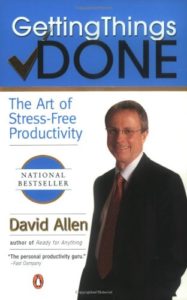
If you could imagine picking and choosing out of all of the people that I have worked with—the coaches, the mentors, the seminar leaders, the breakout speakers at these different conferences, and so forth—I handpick them all and I bring them to you through actually both podcasts, this one and Get Yourself Optimized, which sounds like an SEO podcast, but it’s all about life optimization, spirituality, mindset, biohacking, life hacking, productivity. All of my heroes and people that I consider to be thought leaders in various areas are on my show. I just interviewed last week David Allen for the second time. He has massively changed my life with his book Getting Things Done and his GTD methodology.
I have a friend who is mega-successful and very wealthy. She works really hard, she goes out and speaks. She just lost her grandmother and she told me, “I’ve decided to stop. I just looked at what’s really important in life and it wasn’t the money and it wasn’t the business. It was really spending quality time with the people in your life.” She might take a few months off just to travel and connect more. Yes, business is so important and it’s important to take care of yourself, connect to your loved ones, and make sure they are taken care of because you don’t need to wait for an awakening or an epiphany. You can have this life that is more harmonious right now.
A lot of times, people with business think they will get to be an overnight success. Stephan, what does it take to be an overnight success?
About 10 years, passion, drive. One thing I learned from taking Kabbalah classes with you is that the fuel or the engine for everything that you create in this world is desire. If you don’t have the desire, you’re not going to get anywhere.
If somebody is listening right now and they don’t feel like they have the desire, they’re listening to the episodes, but they’re not implementing. There’s a lack of passion there or a lack of desire, what then they should do?
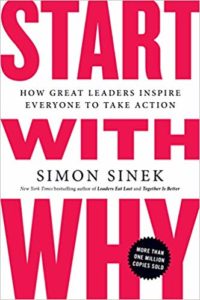
Find a bigger why. Simon Sinek has his book Start with Why. He’s got a famous TED talk. If you have a bigger purpose or reason, let’s say that you’re trying to learn something not just for your own edification but to teach it to others, people that you care about, let’s say, your child, your sibling, or your spouse, then you’ve got a bigger motivation. You’ve got some of that fuel, that desire to make it happen, finally.
Another thing on top of that I can add is, you can pray for that desire. If you have any spiritual practice, you can pray to God, the universe, whatever higher power you believe in and say, “I need this desire, please guide me.” That’s where, if you are spiritual or not, because let’s say you’re not spiritual and you’re not even connected to a higher power, but you pray for something—the electricity in the air—something that will give you that desire, it will change your neurology. It will help you focus on having that desire, then all kinds of answers will show up in your life, and all kinds of unforeseen opportunities will show up because your mind is focused and geared toward finding that desire. And you will find it.
Yeah, and conversely, if your mind is focused on the negative, you’re too sucked into the negative news on Facebook, which is totally a filter bubble, and you’re watching whatever TV news station is your favorite, you’ll attract more negative in your life when you focus on the negative.
To bring in marketing to this whole equation, one of my good friends, Amy Africa is a top-notch usability expert. Also, she’s big into neuroscience and what motivates people. She does all this. She has labs with functional MRI scanners, all the high-tech stuff. One thing she told me about is that your brain changes. It rewires itself if you talk back to your device whether it’s your Google home, your echo, or Alexa. It changes your brain if you smart off to your smart device. If you’re disrespectful to it, it doesn’t care, you’re not hurting its feelings, but you’re hurting your own brain. Be careful of the words you use, of the thoughts you have, of the intentions that you show up with because it does change you and the field around you.
I know that sounds woo-woo, but frankly, I’m woo-woo. If you’re listening to this show, you already know that. I’ve snuck in little bits and pieces of Kabbalah wisdom and so forth in some episodes. This is part of what drives me to do what I do with my podcast is I want to reveal light in the world. That goes for as a marketer not just as a person. We don’t have this professional life that suddenly ends when we clock out or we go home from a hard day at work as an entrepreneur, as an employee, or whatever and now we’re spiritual, religious, or we’re a family man, a family woman, or whatever, it’s all intermingled.
Let’s talk about the mindset of marketing. How does one improve their mindset when it comes to their business?
It depends on what you’re trying to accomplish. Intention is everything. In fact, one of my favorite people on the topic of intention is Ephraim Olschewski. We had him on the show a while back. He talks about how to show up more powerfully, and how to understand what is happening for the other person, like climb that invisible wall between you and that other person. That invisible wall is what he refers to as the wall of context. You climb that, you get into their world, and understand what life is like for them.
Then you can be more effective at selling to them, at servicing them, or at delivering whatever you’re meant to deliver for them. He has an episode on this show, all about how to close big deals. He regularly closes six- and seven-figure deals. He’s an impressive salesperson, but even more impressive as a coach.
Let’s talk about sales because people do marketing effort, they get traffic, but everything shuts down if they don’t know how to make the sale. What type of sales lessons have you learned from this episode?
I climb that wall of context more effectively and more effortlessly. I also have a more powerful frame, you learned in NLP about the frame. Whoever has the stronger frame sets the tone of the conversation. Actually, this one wasn’t from me, but I’ve learned about stretching the gap between where somebody is currently and where they would like to be. Stretching the gap means actually poking at the pain points, understanding what their biggest challenge is, what that’s costing them if they don’t implement, and projecting that into the future like what’s the future cost if they continue to not address that issue. Then, what does the ideal state or outcome look like if they were to hire me to work with them? That’s all been very valuable.

I learned that from Taki Moore who was also a guest on the show. We talk more about Facebook Ads in that particular show. But we did a mastermind together with Taki, his black belt program which was really awesome.
Another recent sales episode was with the Sales Whisperer, Wes Schaeffer. That was a lot of fun. We talked about, for example, CRM systems and how powerful they can be. We use Infusionsoft with our company and we also use Capsule CRM. We have two CRM systems. We have lots of automation setup, especially within Infusionsoft.
If you’re selecting a CRM, whether it’s Infusionsoft, HubSpot, or whatever, you need to understand what your buying criteria are, what the different options are, and make an informed choice because it’s like buying into a timeshare or something. It’s really hard to exit once you’re in. There’s a sunk cost that you won’t be able to get back. Make an informed choice. We talked about CRM systems and how to make that choice in the episode.
I also had Kelly Fidel on the show. That was really a great episode. We talked about sales on that one, too. A mutual friend of both of ours. She closes very big deals.
Her biggest deal when she was corporate was a billion dollars or something like that.
She actually did a billion-dollar deal. That’s the thing about mind over matter. You set your identity and then things just magically show up or just you embody that thing that you believe in.
As Henry Ford said, “Whether you believe you can or whether you believe you can’t, you are right.” When you’re approaching a sales call, you always want to remind yourself that you are good. You remind yourself of your intentions, that you can help this person. You remind yourself that you are here to serve. When you do the call, it’s not about you, it is about the client. What are their dreams? Their desires? How can you be the one who brings them closer to their dream? Like Stephan said, what are their pain points?
You don’t need to be nice, you need to dig into these pain points because if you don’t, (a) you won’t know how to serve them, and (b) when they feel the pain, it reminds them of why they want to work with you. If you know that you are the one that can help them get from A to B or from a painful place to a pleasurable successful place, then you have to have, like Stephan said, the bigger frame and that intention of I know who I am, I know what my service can do for that person. Now we’re going to work together.
You already approached a call as if you already closed it and you probably have this little voice in your head saying all kinds of things, “I’m not sure if I can help them,” or, “They probably cannot afford me,” or you take on their objections as your own. You have to remember that no, if you’re going to give them a lot of success, they can afford you. They cannot afford not working with you.
It’s a disservice for me not to effectively sell them because I can change their world if they hire me.
One thing I’ve been accused of by James Schramko who’s my coach and I’m in his SilverCircle program, he was also a past guest, it was a great episode. James told me that I do way too much educating on my sales calls and virtually no selling on there. If you’re doing a lot of educating and you’re not doing much selling—this is a sales environment—that’s not effective and you’re not doing a service to your prospect.
What are some other sales lessons you’ve learned that were like, “Wow, that sounds amazing”?
One of my accountability buddies and a very good friend is Greg Merrilees. He’s the founder of Studio 1 Design.
He’s a very sweet guy.
He’s an awesome designer. He’s got an awesome team of web designers working for him. Anyways, Greg has shared with me his SOP for sales, which was very generous of him. Thank you, Greg, if you’re listening.
Thank you, Greg.
I want to have a much better SOP more like Greg’s. I don’t actually have an SOP for sales. I need one.
What does SOP stand for?
That’s a good question. Standard Operating Procedure. It’s essentially a checklist on steroids because you’ve thought through all the different scenarios like what are the best practices, what do I want to do, what do I want to achieve, where am I headed with a sales conversation, what do I need to prepare for that call, what do I need to do as a follow-up, what do they need to do in order to prepare and get the most out of the sales call with me, and how do I not over educate them and just deliver lots of free stuff so they feel like, “Okay, thanks. That was great. Really appreciate it.”
The fuel for everything you create in this world is desire. Share on XThat’s a rookie mistake that a lot of people do. It’s not only a rookie mistake because you’re not a rookie and you sold humongous packages (and still do), but it’s that nice girl or a nice boy inside that wants to please everybody and just want to give so they’ll feel good about themselves. We need to hold back because if you give them too much satisfaction, they’ll be like, “Okay, I’m good. I don’t need you anymore,” and then they miss the opportunity of working with you.
Yeah. I don’t know if you, the listener, are into sales or if it’s purely marketing that you care about and sales is not really your thing, but sales and marketing go hand-in-hand. We’ll move off of this topic of sales now, but it’s important for everybody to sell better just like they need to be a better speaker because if you aren’t, you’re not as effective. Whether you are selling externally or internally, you’re selling to your colleagues, to your boss, or to your direct reports a concept, a campaign, an initiative, a new way of doing business, a big vision for the future, or whatever it is you’re selling. As an effective speaker, hopefully, you have a bunch of the skills and techniques that will allow you to influence and guide the listener, the audience to the most fruitful outcome for everybody.
Let’s talk about social media. Facebook Ads, Twitter, YouTube, and all that good stuff. Where would you like to begin?
I consider social media to be most effective when SEO is underpinning it, meaning that SEO should drive a lot of the decision-making around your social media marketing. If it doesn’t, you’re missing a huge opportunity. I was just having a conversation with a prospect about this just the other day that SEO, not being part of the equation, means that you’re just making a lot of noise, like that quote from Sun Tzu, “Tactics without strategy is the noise before defeat.”
And his friend, Lao Tzu.
Yeah. You’re making a lot of noise, but you’re not really as effective. You’re getting tweets out there, you’re posting to Facebook, you’re doing whatever, but it doesn’t last. How often do you have to tweet in order to get a lasting impact? You just can’t ever stop tweeting because the tweet is a flash in the pan.
Same with a Facebook post. Nobody’s going to go back to what you were tweeting and posting on Facebook two weeks ago. That’s ancient history. That’s a problem whereas if your end game is more rankings in Google, more traffic, and more sales because of that and you’re utilizing social media to get in front of the linkerati—the influencers that Google cares about—Google doesn’t care about the Instagram influencers. They usually have really sucky websites. But Google very much cares about those bloggers who have high authority, high trust websites. How do I reach them?
One way I do that is through social media. I have 154,000 followers on my Twitter. I get 1.2 million impressions in reach per month roughly from my Twitter account. That’s a great platform for me to get the word out to the linkerati that I have a new link bait piece out, something that is highly link-worthy in order to get links. Because if you just post something to your blog or to your resources area, or your learning center on your website and hope that people, especially the linkerati discover it, good luck. They’re not going to discover it. You have to get the word out. You have to do social media marketing. You have to also do link outreach using tools like Pitchbox which reminds me of our good friend, Michael Geneles, the co-founder of Pitchbox.
Hi, Michael. If you’re listening, hello.
Michael’s awesome and Pitchbox is awesome. It’s the platform that we use internally for link outreach. It’s great for just digital PR, frankly, not just for link building. It’s like salesforce.com for link outreach. Salesforce.com is, of course, a very powerful and popular platform for CRM and salespeople. Imagine having that capabilities with pipeline reports, workflow, and all that, follow-up sequences and stuff. But instead of for sales, it’s for digital PR and link building. That’s what Pitchbox is. It’s incredible and hugely valuable. I highly recommend you check out Pitchbox and listen to the episode with Michael Geneles.

When I go with you to marketing conferences, it can feel very overwhelming because people talk about Facebook, Instagram, Twitter, YouTube, LinkedIn, and so on and so forth. If you were to choose two or three platforms to focus on, which platforms will you go with?
There are tons of ways you can spread yourself too thin with your marketing, especially social media marketing, all those different platforms out there and even ones that many consider lesser platforms are actually huge opportunities like reddit, though most marketers don’t understand how to market on reddit. It’s a very dangerous place to play if you don’t know what you’re doing.
For somebody who’s not very savvy or even they’re savvy, but they don’t have much time and they want to start with two or three platforms, which ones will that be?
It’s going to depend on the person, what their market is, and all that. But let’s say that you have a very visual brand or you love taking photos, then Instagram is a no-brainer. I mentioned reddit just a minute ago. It’s a great opportunity if you’re willing to invest the time and understanding the platform. A great starting point is to listen to the Brent Csutoras episode that we just had. I’ve had him on the show twice. But the most recent time I had him on, we deep-dived into reddit marketing and how not to have them chase you with pitchforks. That’s a really good one.
Virtual pitchforks. They hate marketers. But reddit is the front page of the internet. It’s one of the top 20 websites on the internet or something. It’s huge. If you have a power user account, you can get so much reach. But you’ve got to do it very carefully. I would recommend LinkedIn, especially, if you’re in business-to-business, and really take advantage of the opportunity with LinkedIn for videos because this is a window of opportunity that will close just like it did with Facebook. Facebook was really into giving you a lot of extra reach if you were doing Facebook Lives and they tapered that off.
Right now, if you upload videos natively to LinkedIn and you also upload as SRT file which is a transcript, a caption file of all the words that you use—pro user tip here—be thoughtful about what words you use in your videos because when you upload them to platforms like LinkedIn, YouTube, Instagram, and all that, many times you will be able to leverage those words that you spoke as keywords that are then searchable in that platform. If I am thoughtful about the words that I use in a video that I shoot to post to my YouTube channel, that’s going to help me with my YouTube SEO and with my Google SEO.
With LinkedIn, what types of videos do you upload and how long are they?
I think a 2–5 minutes long video is a sweet spot for LinkedIn. Again, you want the SRT file with that. If you don’t want to create that from scratch, you just have YouTube create that for you automatically, you upload it first to YouTube and then you download the SRT file from there, correct any errors that the YouTube algorithm made in the speech-to-text and away you go. It even has timestamps.
What about YouTube?
Oh, my goodness. YouTube is incredible. There’s so much there. I’ve had many episodes covering YouTube SEO and just YouTube algorithms, AIs, and so forth, Derral Eves who’s the founder of VidSummit. I’m going to speak at VidSummit. I’m very excited about that.
Social media marketing is most effective when SEO is underpinning it. Share on XCome, say hi to Stephan. When is it?
In October. Go to vidsummit.com to check out the details.
Come and say hi. If you’re into YouTube, it’s going to be probably the best summit for you to be in.
Yeah, it’s so much better than VidCon.
See you in LA.
Yeah. We’ve been to VidCon together. What do you think of VidCon?
VidCon is so cute and it’s quite overwhelming to see this Tenney Roll that has millions of followers.
Yeah, so many subscribers and fans chasing them around.
VidCon is an extraordinary conference for kids and teenagers. You do learn a lot from the experts.
Yeah, but VidSummit is that on steroids.
Yeah. It’s more for the mature audience.
Yeah, if you want to gush about The Try Guys. If you know who The Try Guys are, they’re no longer with BuzzFeed. They left BuzzFeed and they started their own thing from scratch, but they’ve got a huge following. What’s the idea behind The Try Guys? For those who don’t know who The Try Guys are.
It’s just a bunch of guys that go and try everything and some taboo things.
Like what? Like wearing high-heeled shoes all day?
Yes, or wearing weights to feel what female breasts feel like for a whole day. They do all kinds of crazy things. They’re really entertaining, funny, and sweet. I feel like in their channel now, they’re moving more into the personal aspect of who they are and their families. It becomes The Try Guys but also has more of a personal spin to it.
Yeah. I had not heard of The Try Guys before. I wasn’t a big follower of BuzzFeed videos and stuff.
I like BuzzFeed videos.
Yeah, especially the Dear Kitten ones. Those are cute.
Imagine that you’re at VidCon, there are teens and preteens everywhere. Suddenly, this throng of teenagers, especially preteens forms and start screaming and there are these four guys that are walking and they’re just getting surrounded by this throng of pre-teenagers, mostly girls, and I’m like, “Who the heck are these guys?” “They’re The Try Guys” “The what? I’ve never heard of them.” That was my first time hearing about The Try Guys a few years ago at VidCon. That was fun.
YouTube, we’ve got some great episodes about YouTube marketing and SEO. Sean Cannell. He’s got the Video Influencers channel. Video Influencers is a really great learning and training channel on YouTube about YouTubing.
He’s so good. If you want to learn about video equipment and techniques for marketing your videos, just go to his channel. It’s phenomenal. Listen to this episode that Stephan did with him because you’re going to learn a lot. This guy is a force to be reckoned with when it comes to YouTube.
One of my favorite training videos from him is the one on how to optimize your image thumbnails for your YouTube videos because those make a big difference from a click-through standpoint, more important than the title of the video.
What other great video lessons and experts?
Sunny Lenarduzzi. She’s awesome as well. Sunny has this formula called The HOT Script Formula. HOT stands for hook, outcome, and testimonial. Wow, I remember that completely from memory. The hook is where at the very beginning of the video, you say something to the effect of, “In this video, we are going to peel the curtain away behind what really happens in YouTube’s AI-based algorithm,” or whatever. That hooks them. I just totally made that up right there.

The outcome is like, “Okay, from this video, we’re going to cover the three things that make all the difference in getting to the top of Google’s recommendation engine.” Then the testimonials are, “These are the very techniques that I use with some of my biggest clients like Chanel, Volvo, Zappos. They work like gangbusters. They’ve got a 5000% increase in watch time,” or whatever your testimonial stats are. That’s The HOT Script Formula and that’s from Sunny Lenarduzzi who is another YouTube expert.
I love viral YouTube ads and viral marketing on YouTube. I’m super excited to have had Daniel Harmon of the Harmon Brothers. He and his team are the brainchildren behind the Squatty Potty Pooping Unicorn ad that went crazy viral on YouTube. The Poo-Pourri viral ad.
These two ads are pretty genius. It’s new. It’s nothing that you’ve seen before. It’s refreshing, literally, when it comes to Poo-Pourri.
That’s funny. They also did the Purple ad with Goldilocks.
Their ads are so good, unique, and out of the box. If you want to learn more about tapping into your creativity, into your right brain, into that place where all ideas come from, then go, listen to that episode.
If you want to spend a lot of money, just hire Harmon Brothers. But it’s like seven figures is probably what they’re going to spend.
It will probably pay-off if you’re a big company.
Probably, and you’ve got a great product. But if you just want to spend money on advertising on YouTube, then there are two episodes I will highly recommend. One is Tom Breeze, he has a YouTube ad agency. They only do YouTube advertising.
Is there a tagline advertising in a breeze?
No, maybe it should be. Tom is in SilverCircle. Next time, we’re on one of our group calls, I’ll mention that to him. The other expert on YouTube advertising that I’ve had on, a must-listen episode is Tommie Powers AKA Tommie Traffic. This guy has made eight figures off of YouTube advertising personally. This guy is a baller, a big-time internet marketer. We met him through Greg Davis, another interesting episode. We talked some blackhat stuff like he burns through a lot of Facebook accounts to do his shenanigans in terms of Facebook advertising.
Greg Davis was how we met Tommie Powers. Tommie Powers is super smart about YouTube advertising. He does a lot of it for himself. He’s just doing YouTube advertising for his own stuff, not so much for clients. I don’t even know if he has clients.
His tagline should be, “Powers to leveraging YouTube.”
Okay, we’ll pass that on to Tommie. That’s a little bit on YouTube. Where should we go next?
What about Twitter?
I used a platform called Fanbase to help me get to the 154,000 followers that I have. That was so valuable. Ben Landis is the guy behind Fanbase and also a past guest on the show. We talked about a bunch of Twitter-specific techniques. One thing that was a recent change with Twitter, which is unfortunate, is that they have throttled more the number of followers you can add on a daily or monthly basis. A little secret here is that you could add a lot more followers if you have a verified account. You got the little blue check like I do. Ben helped me get that blue check which was awesome.
If you have that blue check, you can add more followers than a regular Twitter user. A lot of people will follow you back. If you are smart about who you follow, i.e., it’s based on your ideal target market, it’s based on competitive research on your competitors and who their followers are and so forth, and you’re following those kinds of folks and then many of them are following you back, you build your Twitter follower account at a much more rapid clip which is what I did, thanks to the Fanbase technology.
Because of that recent throttling, it significantly reduced the number of followers that either verified or non-verified Twitter users can add at a time. That’s a bit of a bummer. But there’s so much opportunity with Twitter still. Maybe President Trump is single-handedly breathing new life into Twitter because he’s so addicted to that platform. he’s probably added at least several years of additional life span onto that technology and that company.
Tactics without strategy is the noise before defeat. - Sun Tzu Share on XThat’s great.
Notice I’m staying apolitical on this. I’m not telling you how I feel about him.
What other quick tips that you can give us about Twitter?
Okay. Get Twitter-verified if you can. That’s super valuable. Also, be mindful about how many tweets you are writing that push people off of the platform because the algorithm does not want to reward you for that. If you think about, “How am I keeping people in the platform so that they are just stuck inside of that ecosystem and not off onto my website, some landing page, or something?” then you’re going to tweet a lot more things like natively-uploaded videos. You can use the Twitter app on your phone and upload videos natively. I bet you didn’t know that.
You can also just upload cute little quote cards, cartoons, or whatever and upload those natively—you can do that from your desktop as well, not just on mobile—and have some cute thing that you say or some clever thoughtful thing that you say along with it but no link. You might think, “What’s the point? I want to drive people to my website.” You want the algorithm to love you, appreciate you, and see you as helping them out.
I want everybody to love me.
Especially Twitter.
I want all the algorithms to love me.
Also, just regular text tweets, just some interesting thing that happened to you, overheard on the subway, or whatever and no link. If you mix all that with the things that you’re pushing—I have a lot of tweets obviously about my podcasts. I drive people to the show notes and to listen to the episode and subscribe through Twitter as a channel. I would be not as effective at that if I only had tweets that linked out.
Thank you for that. Let’s go talk about SEO. You’re one of the top SEO people in the world. You wrote the Bible on SEO.
I co-wrote it.
Yeah. Your book has been taught in universities. What did you have to learn from your guests about SEO?
There are so many things that are happening in the area of SEO. It’s important to stay on top of all of it. You also need to take this as an experimental science, keep testing things, and see what works and what doesn’t work. For example, if you don’t think that word order matters in the Google Search, just try it yourself and see. If you type in market research into Google and see what the search results show and you type in research market into Google and you see that the results are different and they used to be the same, that’s an important bit of information that you could find out on your own by just being inquisitive and treating SEO like a series of experiments that you can try yourself.
When it comes to your SEO guests, what are some of the things that you were like, “I didn’t know that. This is cool,” or, “This was not brought into my awareness,” or, “This is a new update I wasn’t aware of”?
I interviewed Cindy Krum. I don’t know if I learned this from the episode, but I certainly learned it from her, it’s the concept of Fraggles. She might have learned it just from the conference where we chatted. The concept of a Fraggle is it’s a fragment that is URL addressable. It has an anchor associated with it. What it allows you as an SEO to do and also the user, a Google searcher to do is to get right to the bit of content that answers the question or addresses their query.
For example, if you type into Google “how to tango?” you will see a featured video at the top. There are featured snippets, I’ve written about this, I’ve spoken about this before. I’ve got a great Search Engine Land article on how to get featured snippets and how to actually steal some from your competitors.
Where can they find it?
Oh, that’s on Search Engine Land. Again, marketingspeak.com/200. If you do a search for, let’s say, how to tie a tie and you get a featured snippet with a one, two, three, or four lists of things to do, that’s a featured snippet. A featured video is like a YouTube video that is the answer instead of a paragraph, a numbered list, a bullet list, or even a table. If you type in how to tango into Google, you will get a featured video that isn’t just the whole video, it has the segment of the video that’s specific to how to tango already highlighted and ready for you to go, just hit play. That is an example of a Fraggle.
More examples of Fraggles will show up as you start to understand what you’re looking for. These are fragments of pieces of content, whether it’s an article, a video, or whatever and you can jump directly to that part of the content from the Google Search results page, from the SERP.
That’s a pretty awesome concept that Cindy believes. I would agree with her that the knowledge graph is going to be full of these Fraggles, that they’re going to siphon up all of these fragments of content from your websites, from your video libraries, from your PDFs, from everything and create a massive database for them to leverage and keep people within their platform.
Speaking of platform, keeping people in the ecosystem, Google wants to keep people on Google. If they provide the complete answer leveraging your content and the user didn’t have to end up on your site, boom, that’s a big win for Google.
When it comes to content marketing, what is some advice that you can give somebody based on interviews you did here or just based on your own knowledge?
I do have on my list of folks to interview. Andy Crestodina, I learned from him the concept of the evil twin, which is really cool. You can imagine you’re writing a viral content piece for your blog and you, let’s say, have talked about 15 best practices for XYZ, for YouTube SEO, or something. What is the evil twin of that, what’s the flip side of that, what do you think? Fifteen best practices to get your videos to the top of the YouTube search results, that’s the best practice, what would be the opposite of that?
The 15 biggest mistakes you make on YouTube.
Yeah. Exactly. You just take the opposite and create another article that you’ve just leveraged all the research that you did, all the curating that you did, and spin it differently, paraphrase the content, and now you’ve got a second version of the article, the evil twin that you can submit to a third party website, let’s say you have a column somewhere. I have a column I write for Search Engine Land, I have a column with Adweek. I could submit my evil twin version to them and not be in violation of the requirements that it’s a unique article that only gets published on their site. That’s pretty awesome.
That is pretty awesome. Did you ever have a guest that you didn’t agree with? You were like, “No, stop. This is wrong,” or maybe you were too polite to not agree with him or her.
That’s funny. I just had an interview last week like that. It hasn’t aired yet. Larry Kim was the guy I interviewed. I think very highly of him. He founded a very successful company WordStream, sold it for $150 million to Gannett. He had a great exit. It was awesome. Now he’s got another startup. But we started getting into it about SEO and it was pretty funny. I’m keeping all that in the interview, but that’s going to air in probably two or three months. That’s an example of one where I’m like, “Yeah, I don’t think that it works that way.” “Nope, nope, that’s not how I would do it.”
Always approach your marketing as an asset building strategy. Share on XLet’s agree to disagree, mister. On my podcast, Stellar Life, I sometimes disagree with guests, especially when it comes to fitness. Sometimes I feel like I make my guests uncomfortable like, “Actually, according to research,” but it doesn’t happen that much. I usually really enjoy them.
Yeah. You do have to hold your own. If you disagree with somebody, it’s a disservice to your listeners to not say something.
Yeah. There are so many topics on Marketing Speak and even some we didn’t touch. Just go back and learn more about all the amazing marketing tools and tips that you can find on this website. Before we finish, there are episodes about copywriting, podcasting, reputation management, PR, paid search, Amazon, domain names, sales, and conversion. There are so many good episodes for whatever you need, there is an episode for that. Just go on marketingspeak.com. Type the topic in the search bar and you will probably find an episode that will help you take your business to the next level.
We also have a topics tab with a list of a dozen different topics in there. We’ve organized the podcast by topics. We also have the full transcript associated with each episode. You can just do keyword searches either within the internal search engine of marketingspeak.com or just by doing a Google Search.
I know you like to keep secrets, but please don’t keep this podcast the best-kept secret. If you found an episode that helped you, share it with your friends, tweet about it, comment. Just share the love. Share it with the world. Stephan, what are your three top marketing tips?
That’s a great question. That’s the one that you ask at the end of every one of your episodes.
Yeah. As my guest, what are your three top tips to living a stellar life? It doesn’t have to be marketing related. It can be mindset. It can be anything.
Yeah. Before I answer that question, let our listeners know where they can find your podcast.
You can find my podcast on stellarlifepodcast.com.
Awesome, or just search in your favorite podcast app for Stellar Life. My three top tips for marketing. My first tip is one I credit to Jay Abraham, one of the marketing greats, the godfather of marketing.
And your friend.
Yeah. He’s been on the show multiple times. Twice on this show, once on Get Yourself Optimized. I’ve also been on his show on The Ultimate Entrepreneur a couple of times. That’s pretty exciting that I get to have been on his show. But the concept is preeminence. That means that you are doing a service to your prospect by sending them away if that’s the best thing for them. Say, “Actually, I’m not the best fit for X, Y, or Z. you should go to my competitor for this thing because that competitor is going to do a much better job for you.”
My second tip is to repurpose your content into different formats, different packaging depending on whether your content piece has legs or not. If it has traction, then you want to leverage it in many different forms. For example, let’s say that you have a listicle that you write, or your team writes for you, or you outsource. It’s like the 15 biggest mistakes that everybody makes in SEO—I just made that up—imagine that’s the listicle. It does really well and you decide to repurpose that in many forms. You do the evil twin strategy as I mentioned. But you also format it into, let’s say, an infographic and into a social video using Lumen5. You also create a SlideShare deck out of it. You can get a lot more leverage out of the things that are really hitting a chord with your audience or with the linkerati and repackage it, repurpose it in many different formats.
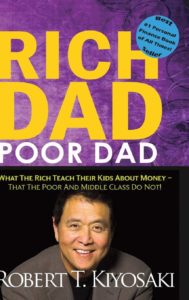
Then my last one is to approach your marketing as an asset building. You are building an asset and if you ever read the book Rich Dad Poor Dad by Robert Kiyosaki defines an asset as something that puts money in your pocket month after month and a liability is something that takes money out of your pocket month after month. A house that you live in, that you own is probably a liability. It’s costing you money every month, whereas a house that you bought and you have renters, you have tenants, they’re paying you every month and it’s more than covering the mortgage, that is an asset.
If you are building assets with your online marketing initiatives, you’re doing things like building your email list, you’re building your retargeting audience or your remarketing audience depending on whether you’re talking Facebook or Google. You are building your fan base on social platforms—Twitter and wherever else—you are either building assets, link building, for example, as an asset-building activity, or you’re just doing things that don’t have any staying power.
If you are spending money on, let’s say, Facebook Ads and there’s no real significant strategy or differentiator, you’re spending money, you’re getting some leads, it’s working, but then you run short on cash and you stop spending money, guess what happens to the lead flow? It’s gone. That’s not an asset if you stop getting any benefit when you stop investing. Whereas let’s say, you do link building, you get a lot of traction for six months and then you stop, take six months off, you’re still going to reap benefits for those six months that you’ve stopped link building even though you’re not going to get as much value you have created an asset, your authority in your trust, and link equity that’s going to pay dividends month after month, year after year. There you go. That was a long-winded answer.
Thank you. The three tips are remember to send your prospect away if they are not a good fit, and repurpose your content because you can and you should, and approach your marketing as asset building.
Stephan, thank you so much for all your nuggets of wisdom. If somebody wants to contact you, maybe work with you, learn more about you beyond just knowing you as a podcast host, where can they go?
Of course, they can go to stephanspencer.com which is my primary website. If you, the listener, wanted to learn more about up-leveling your personal life, your productivity, your mindset, all that, then definitely go to getyourselfoptimized.com and subscribe to my podcast—not this one, but the other one—and if you wanted to work with me in either a consulting or coaching capacity, I do both, then contact me. Send me an email [email protected] and let’s talk.
I also have a Contact Us form on stephanspencer.com. You could sign up that way. You can even schedule a time to meet with me and get an initial consultation session with me.
Great. Thank you very much.
Thank you. This was a lot of fun. I want to have you on more often. Once every 100 episodes is a long time to wait.
Thank you, and thank you, listeners. Thank you for listening to this episode. I hope you benefited from this episode. As I mentioned before, comment, share, spread the love, and have a beautiful day.
Important Links
- Stephan Spencer
- [email protected]
- Twitter – Stephan Spencer
- The Art of SEO
- Google Power Search
- Social ECommerce
- Get Yourself Optimized
- Orion Talmay
- Stellar Life Podcast
- Marketing Speak Episode 100
- Ephraim Olschewski – previous episode
- Taki Moore – previous episode
- Wes Schaeffer – previous episode
- Kelly Fidel – previous episode
- James Schramko – previous episode
- Michael Geneles – previous episode
- Brent Csutoras – previous episode
- Derral Eves – previous episode
- Sean Cannell – previous episode
- Sunny Lenarduzzi – previous episode
- Daniel Harmon – previous episode
- Tom Breeze – previous episode
- Tommie Powers – previous episode
- Greg Davis – previous episode
- Ben Landis – previous episode
- Cindy Krum – previous episode
- Jay Abraham – previous episode
- Larry Kim – previous episode
- Jonathan Levi – GYO previous episode
- Getting Things Done
- Start with Why
- Rich Dad Poor Dad by Robert Kiyosaki
- GTD methodology
- Simon Sinek
- Simon Sinek: How great leaders inspire action
- Amy Africa
- Netconcepts
- Covario
- Rio SEO
- Zappos
- Sony
- Quiksilver
- Best Buy Canada
- Bed Bath & Beyond
- Chanel
- Harvard Business Review
- Adweek
- Genius Network
- Traffic & Conversion Summit
- Kabbalah
- Infusionsoft
- Capsule CRM
- HubSpot
- Henry Ford
- Studio 1 Design
- Sun Tzu
- Lao Tzu
- Pitchbox
- Salesforce.com
- VidSummit
- VidCon
- The Try Guys
- BuzzFeed
- Dear Kitten
- Video Influencers
- Harmon Brothers
- Squatty Potty Pooping Unicorn
- Poo-Pourri viral ad
- Poo-Pourri
- Purple ad with Goldilocks
- SilverCircle
- Fanbase
- President Trump
- How to rank for ‘position 0’ in 3 simple steps: A featured snippets primer
- Search Engine Land
- Andy Crestodina
- WordStream
- Gannett
- The Ultimate Entrepreneur
- Lumen5
- SlideShare
Your Checklist of Actions to Take

















[…] episode Jay Abraham – previous episode Joe Polish – Marketing Speak previous episode Orion Talmay – Marketing Speak previous episode Orion Talmay – previous episode Seth Godin – […]